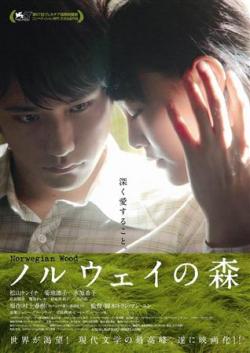Norwegian Wood

Norwegian Wood (ノルウェイの森), directed by Tran Anh Hung, 2010, 133 minutes
Review by Susan Meehan
The film Norwegian Wood, directed by the Franco-Cambodian director Tran Anh Hung (of The Scent of Green Papaya fame), is based on Haruki Murakami’s 1987 novel of the same name. It wasn’t his first novel, preceded as it was by Pinball, 1973; A Wild Sheep Chase and Hard Boiled Wonderland and the End of the World but it became his most famous – a cult book, catapulting Murakami into the stratosphere and compelling him to remain abroad for a number of years, shying away from the frenzy his coming of age novel had caused.
It is 1969 and Toru Watanabe is in love with Naoko, his late best friend’s girlfriend. Naoko, played by Rinko Kikuchi [菊地 百合子] (known for her role in Babel) is a fragile, troubled, taciturn beauty coming to terms not only with the suicide of Kizuki, her childhood boyfriend who took his life on his seventeenth birthday, but that of her older sister as well.
A few years later, against the heady backdrop of the 1960s student protests at the renewal of the US-Japan Security Treaty Toru, now a university student in Tokyo, bumps into Naoko and slowly gains her trust and affection bonded as they are by adolescent memories.
On her 20th birthday, a nostalgic and melancholy Naoko sleeps with Toru in what seems a breakthrough in their tentative relationship. Naoko then disappears, devastating a disconcerted Toru. Hearing that she is coping with her depression in a sanatorium in the outskirts of Kyoto, Toru begins corresponding with her and occasionally visiting the convalescing Naoko.
Back in Tokyo, far away from Naoko, living with his womanising friend Nagasawa and choosing not to disclose details of his love interest to anyone, Toru is left increasingly lonely though resolutely faithful to Naoko. An occasional diversion are his occasional encounters with his classmate Megumi, a beautiful, smiley, sensual, teasing and optimistic woman who deals with her own profound sadness by annihilating her sorrow through sheer relentless positiveness. Megumi offers Toru the opportunity of forging ahead while Naoko, trapped by her anguish, cannot face the future.
Toru remains true to both women, never reneging on any promises made … I won’t spoil it for those who haven’t read the book or seen the film yet by revealing how matters conclude.
Norwegian Wood is beautifully filmed; the setting and lighting are magnificent and the Johny Greenhead (Radiohead) soundtrack a bonus. The lush Japanese countryside is a wonderful contrast to cinegenic Tokyo and the close-ups of the young actors in 1960s-fashion lure in the viewer. So hushed was the audience watching the film that I hardly dared breathe let alone eat any popcorn lest it break the trance.
The acting is superb and Kiko Mizuhara (水原 希子), the Korean-American model who played Megumi, a real revelation. She is beautiful to watch and played Megumi’s optimistic character like a ray of sunshine.

